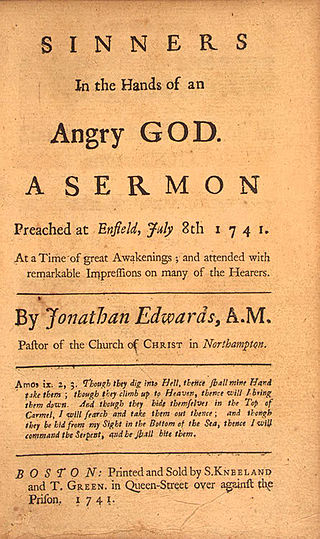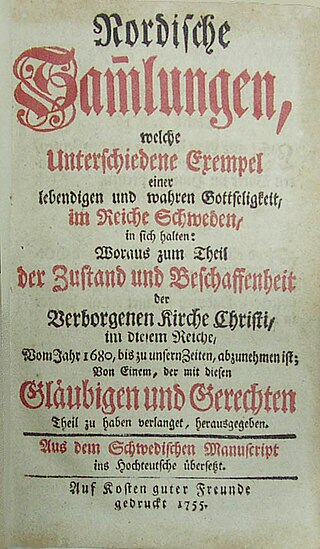Related Research Articles
Some Christian Churches, Christian groups, and ordinary Christians express religious antisemitism toward the Jewish people and the associated religion of Judaism.
Christianity began as a movement within Second Temple Judaism, but the two religions gradually diverged over the first few centuries of the Christian era. Today, differences of opinion vary between denominations in both religions, but the most important distinction is Christian acceptance and Jewish non-acceptance of Jesus as the Messiah prophesied in the Hebrew Bible and Jewish tradition. Early Christianity distinguished itself by determining that observance of halakha was not necessary for non-Jewish converts to Christianity. Another major difference is the two religions' conceptions of God. Depending on the denomination followed, the Christian God is either believed to consist of three persons of one essence, with the doctrine of the incarnation of the Son in Jesus being of special importance, or like Judaism, believes in and emphasizes the Oneness of God. Judaism, however, rejects the Christian concept of God in human form. While Christianity recognizes the Hebrew Bible as part of its scriptural canon, Judaism does not recognize the Christian New Testament.
The term Judeo-Christian is used to group Christianity and Judaism together, either in reference to Christianity's derivation from Judaism, Christianity's recognition of Jewish scripture to constitute the Old Testament of the Christian Bible, or values supposed to be shared by the two religions. The term Judæo Christian first appeared in the 19th century as a word for Jewish converts to Christianity. The term has received much criticism, largely from Jewish thinkers, as relying on and perpetuating inherently antisemitic notions of supersessionism, as well as glossing over fundamental differences between Jewish and Christian thought, theology, culture and practice.

Jews for Jesus is an international Christian missionary organization headquartered in San Francisco, California, that is affiliated with the Messianic Jewish religious movement. The group is known for its proselytism of Jews and promotes the belief that Jesus is the Christ and the Son of God. It was founded in 1970 by Moishe Rosen as Hineni Ministries before being incorporated under its current name in 1973.

Messianic Judaism is a modernist and syncretic sect that considers itself Jewish. Many Jews and Jewish authority figures, both in the United States and Israel, consider it a part of Evangelical Christianity.
Pietism, also known as Pietistic Lutheranism, is a movement within Lutheranism that combines its emphasis on biblical doctrine with an emphasis on individual piety and living a holy Christian life.
The Good Friday prayer for the Jews is an annual prayer in some Christian liturgies. It is one of several petitions, known in the Catholic Church as the Solemn Intercessions and in the Episcopal Church as the Solemn Collects, that are made in the Good Friday service for various classes and stations of peoples: for the Church; for the pope; for bishops, priests and deacons; for the faithful; for catechumens; for other Christians; for the Jews; for others who do not believe in Christ; for those who do not believe in God; for those in public office; and for those in special need. These prayers are ancient, predating the eighth century at least, as they are found in the Gelasian Sacramentary.
Christian−Jewish reconciliation refers to the efforts that are being made to improve understanding and acceptance between Christians and Jews. There has been significant progress in reconciliation in recent years, in particular by the Catholic Church, but also by other Christian groups.

Christian Zionism is a political and religious ideology that, in a Christian context, espouses the return of the Jewish people to the Holy Land. Likewise, it holds that the founding of the State of Israel in 1948 was in accordance with biblical prophecies transmitted through the Old Testament: that the re-establishment of Jewish sovereignty in the Levant—the eschatological "Gathering of Israel"—is a prerequisite for the Second Coming of Jesus Christ. The term began to be used in the mid-20th century, in place of Christian restorationism, as proponents of the ideology rallied behind Zionists in support of a Jewish national homeland.
A number of religious groups, particularly Christians and Muslims, are involved in proselytization of Jews: attempts to recruit or "missionize" Jews. In response, some Jewish groups have formed counter-missionary organizations to discourage missionary and messianic groups such as Jews for Jesus from using practices that they say are deceptive.

The First Great Awakening or the Evangelical Revival was a series of Christian revivals that swept Britain and its thirteen North American colonies in the 1730s and 1740s. The revival movement permanently affected Protestantism as adherents strove to renew individual piety and religious devotion. The Great Awakening marked the emergence of Anglo-American evangelicalism as a trans-denominational movement within the Protestant churches. In the United States, the term Great Awakening is most often used, while in the United Kingdom, the movement is referred to as the Evangelical Revival.
The Catholic Church and Judaism have a long and complex history of cooperation and conflict, and have had a strained relationship throughout history, with periods of persecution, violence and discrimination directed towards Jews by Christians, particularly during the Middle Ages.

On the Jews and Their Lies is a 65,000-word anti-Judaic and antisemitic treatise written in 1543 by the German Reformation leader Martin Luther (1483–1546).

The Hebrew Christian movement of the 19th and early 20th centuries consisted of Jews who converted to Christianity, but worshiped in congregations separate from denominational churches. In many cases, they retained some Jewish practices and liturgy, with the addition of readings from the Christian New Testament. The movement was incorporated into the parallel Messianic Jewish movement in the late 1960s.
Anti-Judaism describes a range of historic and current ideologies which are totally or partially based on opposition to Judaism, on the denial or the abrogation of the Mosaic covenant, and the replacement of Jewish people by the adherents of another religion, political theology, or way of life which is held to have superseded theirs as the "light to the nations" or God's chosen people. The opposition is maintained by the appropriation and adaptation of Jewish prophecy and texts, and the stigmatization of the very people who transmitted those texts. According to David Nirenberg there have been Christian, Islamic, nationalistic, Enlightenment rationalist, and socio-economic variations of this theme.

Radical Pietism are those Christian churches who decided to break with denominational Lutheranism in order to emphasize certain teachings regarding holy living. Radical Pietists contrast with Church Pietists, who chose to remain within their Lutheran denominational settings. Radical Pietists distinguish between true and false Christianity and hold that the latter is represented by established churches. They separated from established churches to form their own Christian denominations.

Christian Zionism in the United Kingdom is a Christian ideology that sees the return of the Jews to Israel as a fulfilment of scriptural prophecy. Supporters of Christian Zionism believe that the existence of the Jewish State can and should be supported on theological grounds.

Robert Stearns is an American pastor and Evangelical Christian leader who founded Eagles' Wings Ministries located in Clarence, New York and currently pastors the historic Tabernacle Church in Orchard Park, New York. A "leading voice in the Christian Zionist movement," Stearns is the leader and co-founder of the annual Day of Prayer for the Peace of Jerusalem: The single largest international Christian Zionist event and during which thousands of churches worldwide pray for the peace of Jerusalem. Currently, he resides in Clarence, New York with his three sons. They have begun to follow in his musical footsteps by forming a music collective called The Brothers of Mercy.
References
- ↑ Moo, Douglas J. (1996). The Epistle to the Romans. Eerdmans. p. 719.
- ↑ Moo, p. 724.
- ↑ Moo, p. 726.
- ↑ Jesus of Nazareth: Holy Week . Huntington: Our Sunday Visitor. 2011. ISBN 978-1-58617-500-9.
- 1 2 Allen, John L. (10 March 2011). "Church should not pursue conversion of Jews, pope says". National Catholic Reporter . Retrieved 20 January 2013.
- ↑ Graham Noble, "Martin Luther and German anti-Semitism," History Review (2002) No. 42:1-2.
- ↑ Robert Michael, "Christian racism, part 2", H-Net Discussions Networks, 2 Mar 2000.
- ↑ Murray, Iain (1971). The Puritan Hope. Banner of Truth Trust. p. 41.
- ↑ Murray, The Puritan Hope, 44-45.
- ↑ Murray, The Puritan Hope, 45-46.
- 1 2 Lewis, Donald M. (2014-01-02). The Origins of Christian Zionism: Lord Shaftesbury and Evangelical Support for a Jewish Homeland. Cambridge University Press. ISBN 978-1-107-63196-0.
- ↑ Murray, The Puritan Hope, 155.
- ↑ Hal Lindsey, Carole C. Carlson, The Late Great Planet Earth , Zondervan, 1970, p. 167, ISBN 978-0-310-27771-2
- ↑ US group denounces call by evangelical alliance for conversion of European Jews Archived July 28, 2009, at the Wayback Machine . European Jewish Press. Published September 5, 2008.
- ↑ Ecumenical Considerations on Jewish-Christian Dialogue (World Council of Churches)
- ↑ Policies of mainline and liberal Christians towards proselytizing Jews (religioustolerance.org)
- ↑ Why Evangelize the Jews? By Stan Guthrie. Christianity Today . Published March 25, 2008.
- ↑ Many Americans Say Other Faiths Can Lead to Eternal Life. Pew Forum on Religion and Public Life. Published Dec. 18, 2008.
- ↑ Oremus et pro Iudaeis: Ut Deus et Dominus noster illuminet corda eorum, ut agnoscant Iesum Christum salvatorem omnium hominum.(Oremus.Flectamus genua.Levate.) Omnipotens sempiterne Deus, qui vis ut omnes homines salvi fiant et ad agnitionem veritatis veniant, concede propitius, ut plenitudine gentium in Ecclesiam Tuam intrante omnis Israel salvus fiat. Per Christum Dominum nostrum. Amen.
- ↑ Second sticheron at Lord, I Have Cried. Mother Mary and Metropolitan Kallistos Ware. The Lenten Triodion. 2nd ed. South Canaan: St. Tikhon's Seminary Press, 2002. 612. Print.
- ↑ Second sticheron at the Aposticha. ibid, page 598.
- ↑ Third sticheron at the Beatitudes. ibid, page 589.
- ↑ Thirteenth antiphon. ibid, page 586. The phrase "plotted in vain" is drawn from Psalm 2:1.
- ↑ "The Conversion of the Jews", Paris Review (Spring 1958, No. 18). The story was also published a year later in Philip Roth, Goodbye, Columbus, and Five Short Stories (1959)